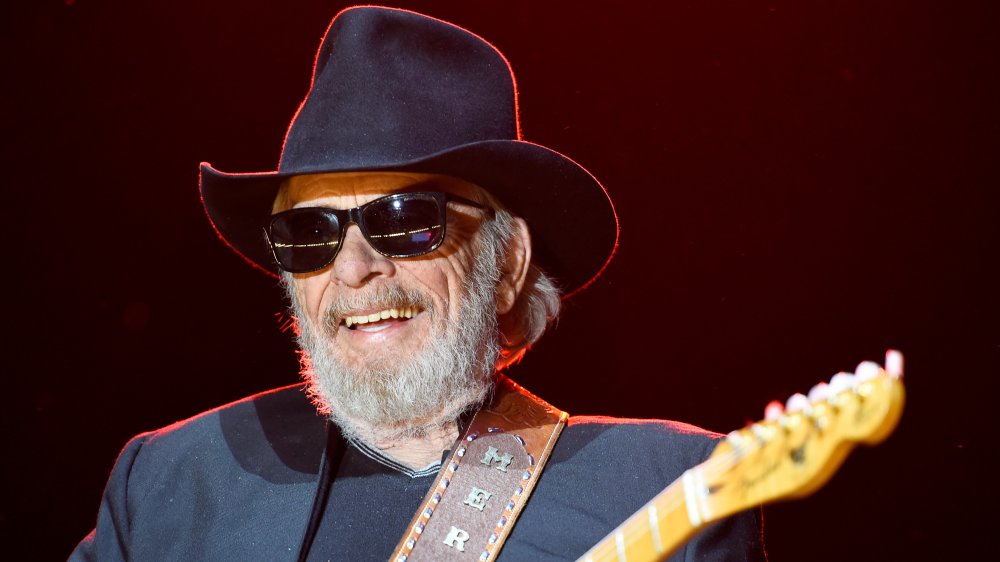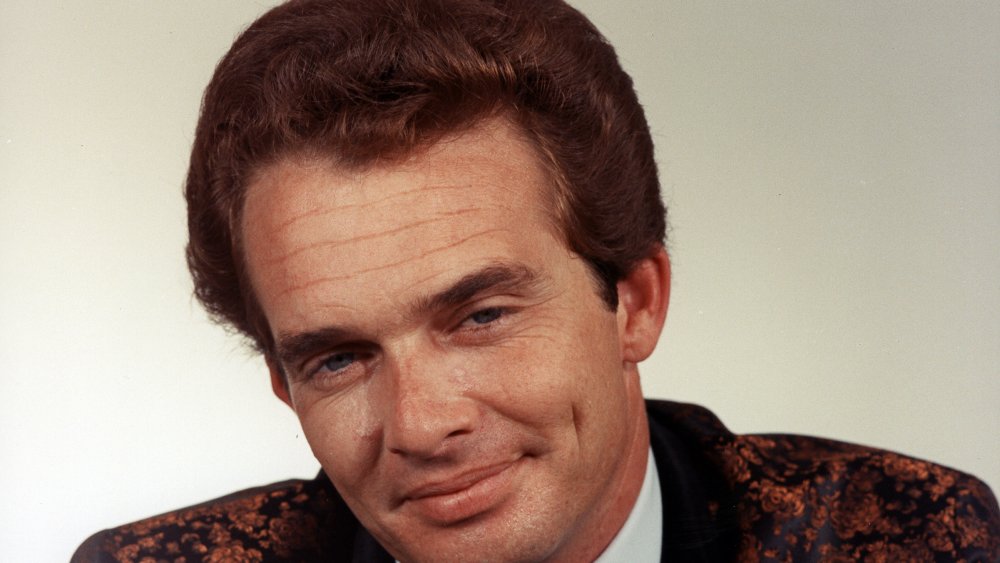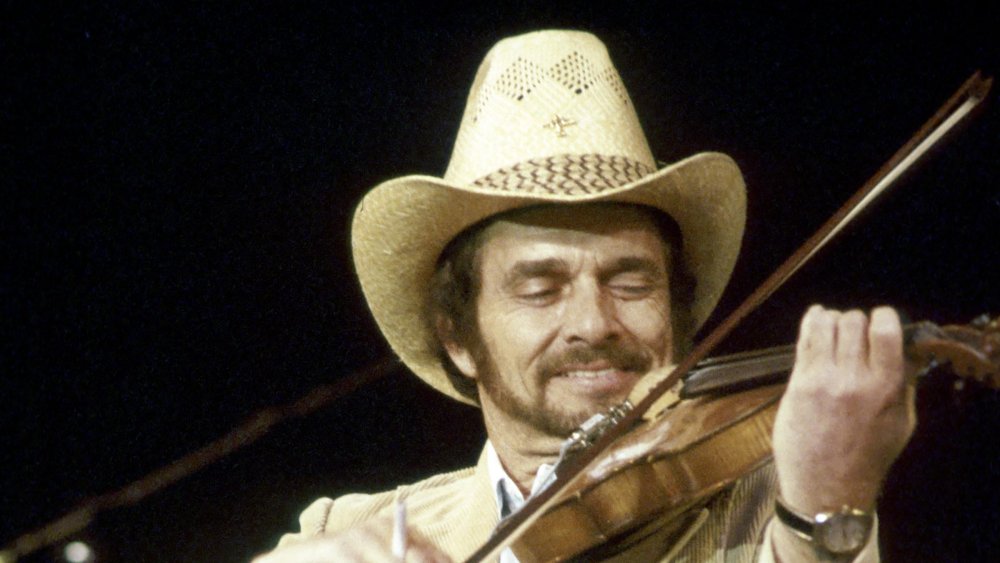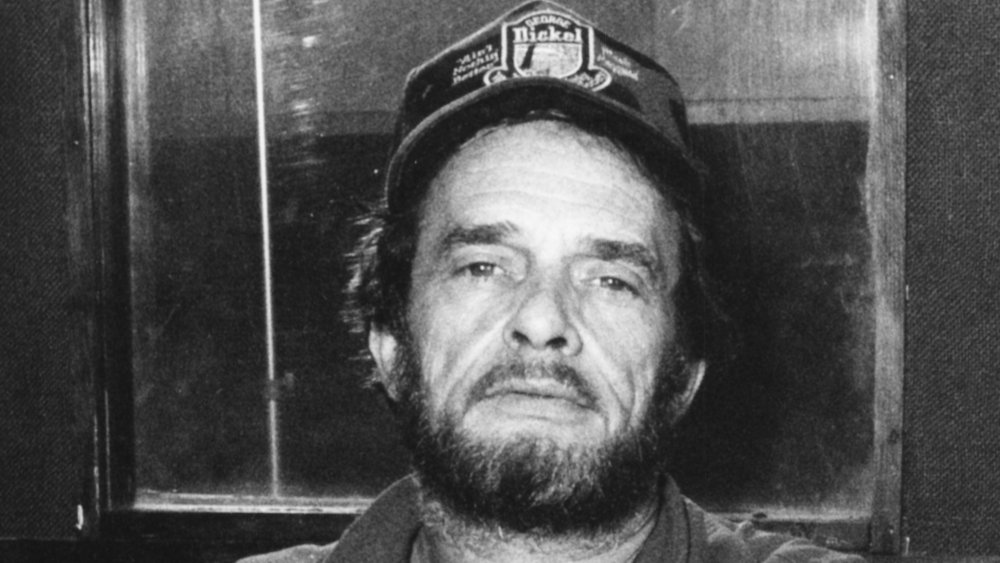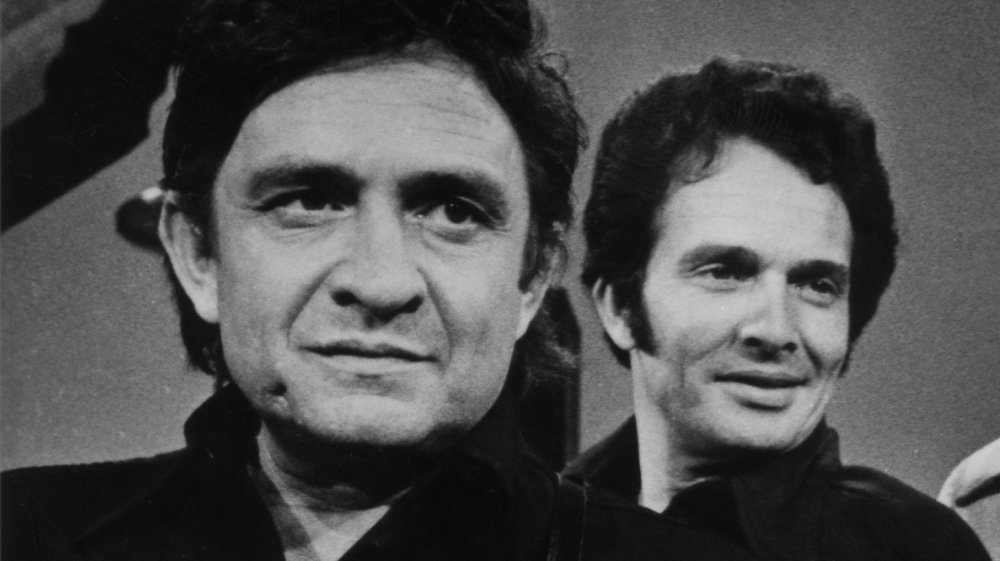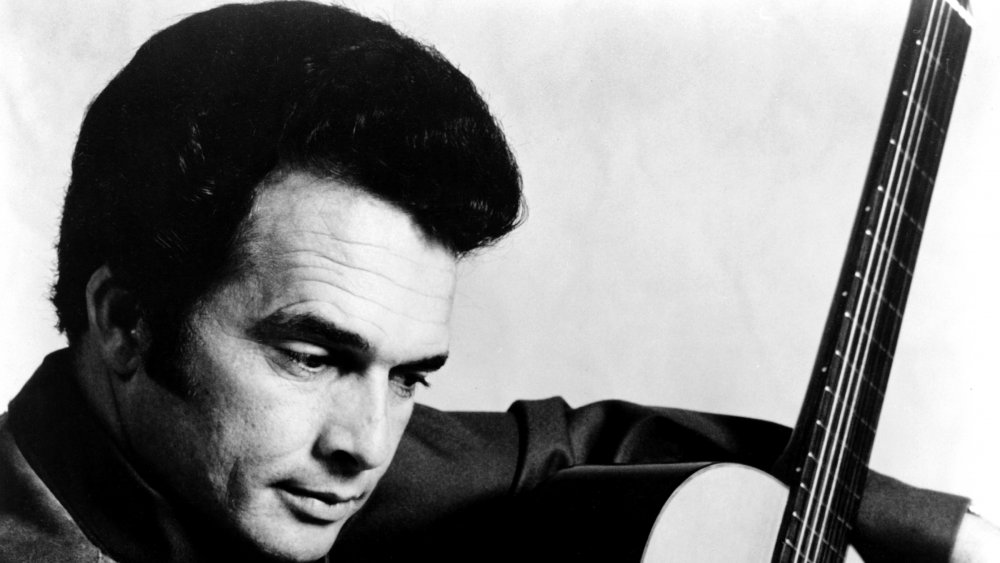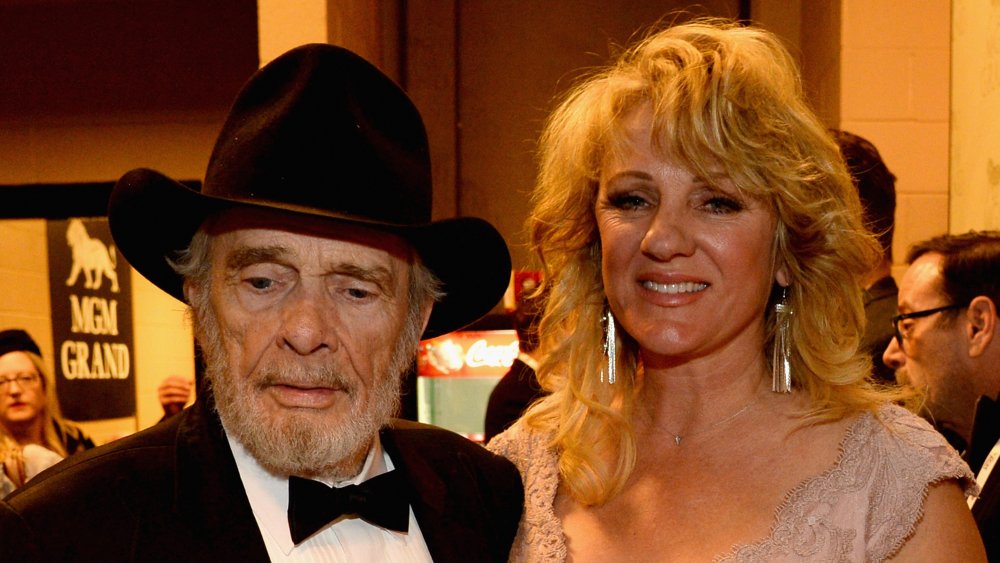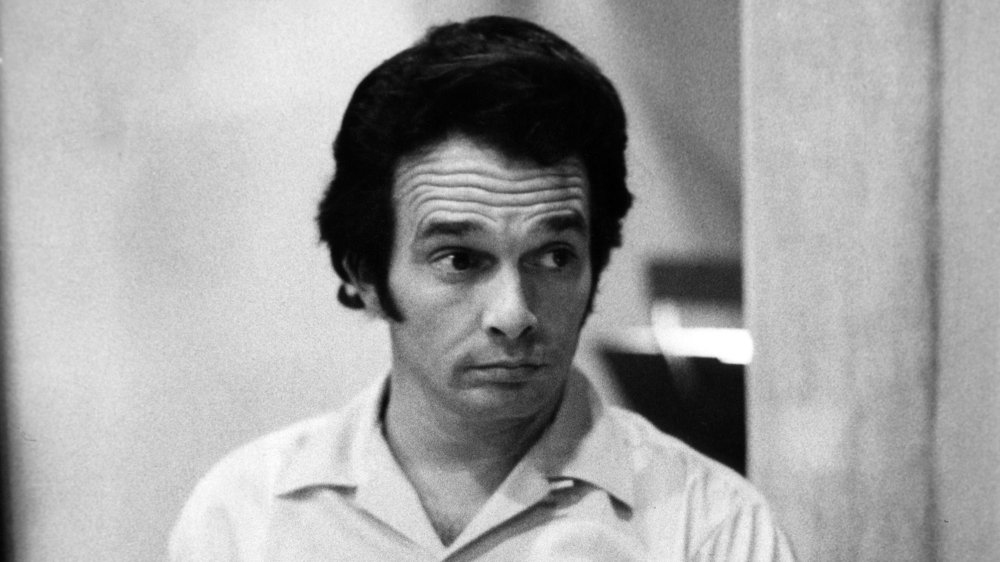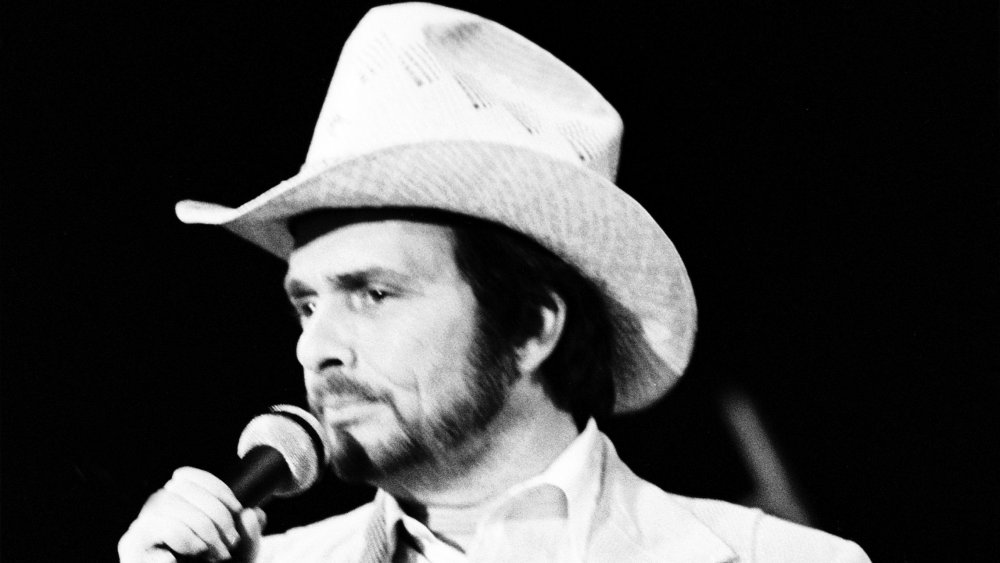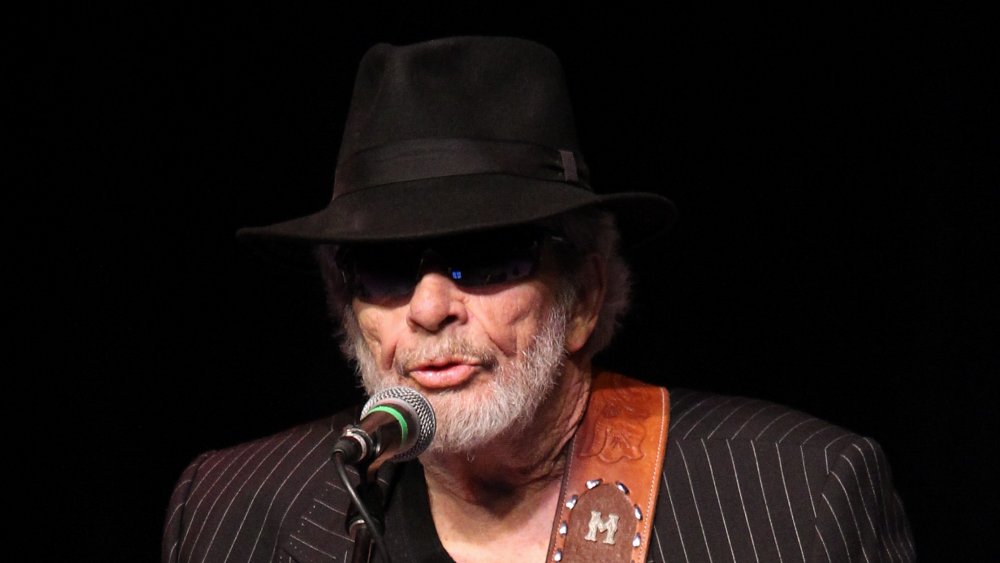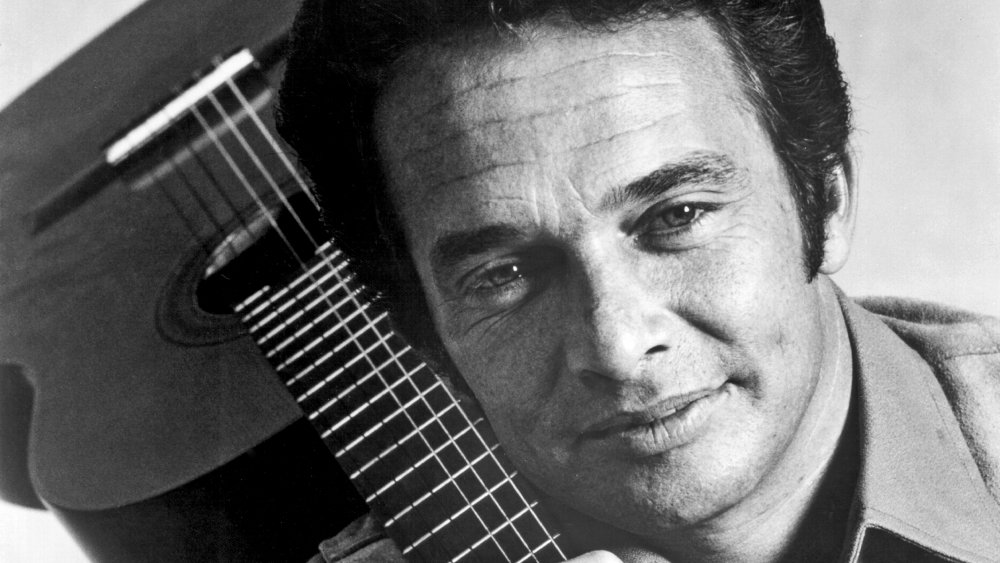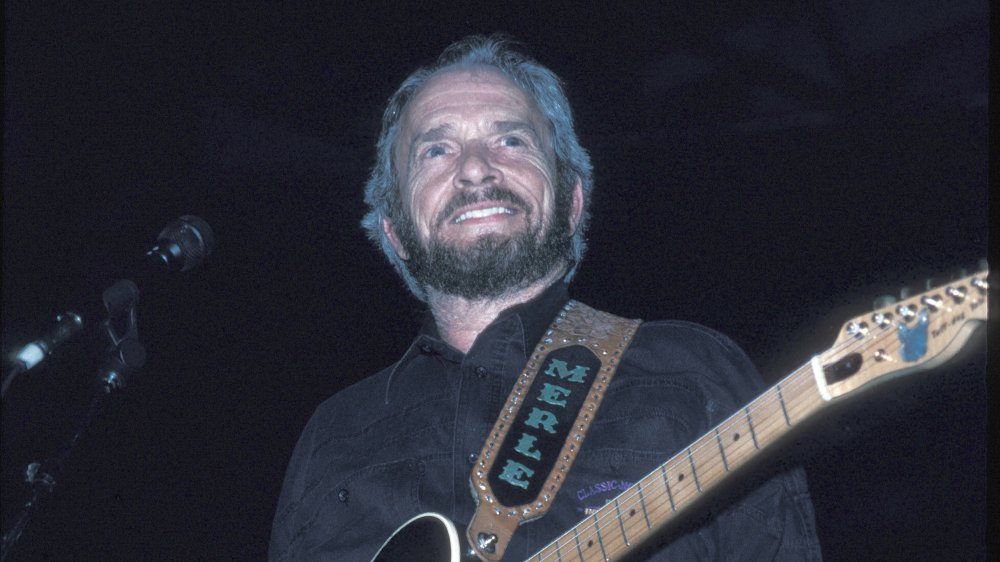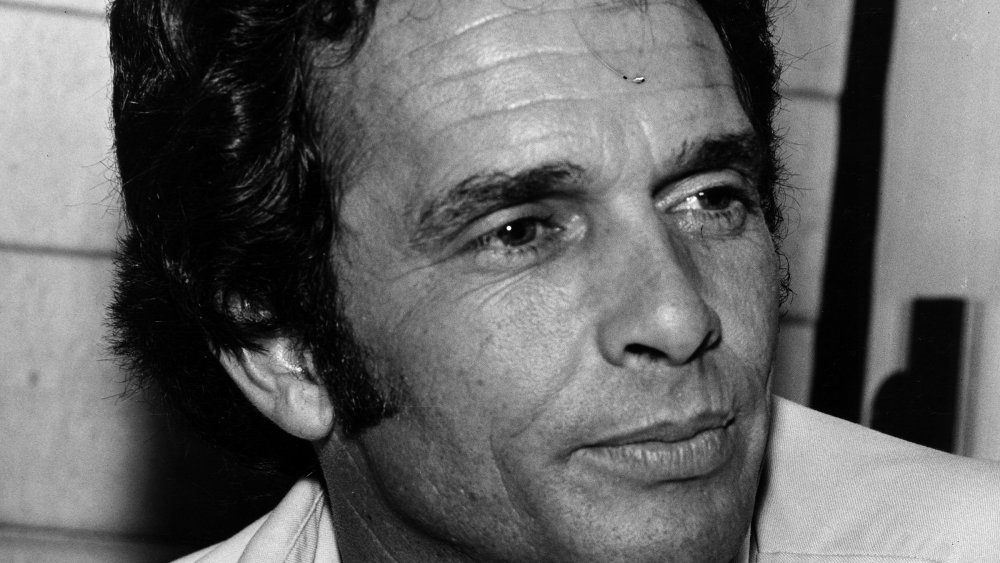The Tragic Real-Life Story Of Merle Haggard
Legendary musician and singer Merle Haggard had a unique personality and delivered several hits in his lifetime, such as "Someday When Things Are Good," "Always Wanting You," The Fightin' Side Of Me," Misery And Gin," and "Sing Me Back Home." He was known for singing about underrepresented groups and fought his way to the top in the music industry. He was honored with several awards in his lifetime, including a Grammy Lifetime Achievement Award in 2006.
While Haggard had a pretty illustrious career as a country musician, there are several aspects of his story that are either unknown or misunderstood. For example, he spent a long time rebuilding his life after a rough start and worked hard to change his ways. Here's a look at some of the most interesting parts of Merle Haggard's long life, including his tragic childhood, his rocky relationships, his association with Johnny Cash, and more.
Merle Haggard had a rough childhood
Merle Haggard was born on April 6, 1937. His family was not well-off, and they lived in a refurbished boxcar in California. According to The New York Times, the musician's father, James, learned of the boxcar from someone at church who wondered whether he could help convert a train car into a home. While the home was only supposed to be transient, the Haggard family spent a lot of time remodeling it and making it worthy of being lived in.
The family was struck by tragedy when James died suddenly in the spring of 1946. Per Rolling Stone, nine-year-old Merle could tell something was up when he was on his way home on that fateful day with his mom. "Before I even got to the yard, I could tell something was wrong," he later said, looking back on the traumatic incident. As he entered the house, he found James alone, crying. He had never witnessed his father crying before. What happened? James had suffered a stroke while driving and had somehow managed to get himself home.
His family took him to the hospital. A few days later, James passed away, leaving Merle devastated. "Something went out of my world that I was never able to replace," he said later. He also mentioned in an interview with Rolling Stone's Jason Fine that things would have turned out differently, perhaps, if his father had survived.
Merle Haggard's family didn't approve of music
As a kid, Merle Haggard found himself being drawn to music. Before his father's untimely death, he noticed that neither of his parents were particularly big on music. His mom didn't like the family's acquaintances playing music because she believed that those who turned to songs were rebellious. Additionally, James didn't openly express any kind of appreciation for music, or entertainers in general, either.
However, Haggard told GQ in an interview that when he'd look into James' eyes, he'd feel like his dad secretly wanted to pursue a life in the performing arts himself. However, James had to lead a life free of such "rebellion" because of his wife, who was persistent about her stance on the matter. "I think they were interesting to me because I'd seen that look in his eye," Haggard said. "I didn't know what it was about."
Merle Haggard was rebellious
After losing his dad, Merle Haggard became a rather rebellious kid. According to Rolling Stone, losing James meant that Merle's home didn't quite feel like home to him, and he sought adventures outside. In other words, he ended up breaking the law many times. As explained by History.com, Haggard was only 11 years old when his mom sent him to the juvenile authorities, calling him "incorrigible." Haggard would serve more jail time as a teenager, even plotting an escape and succeeding. Finally, in 1957, he ended up in San Quentin for robbery charges. While he was originally unsure how long he would be in prison, he ended up spending three years there before leaving.
As illustrated in his 2011 autobiography, My House of Memories, Haggard saw a friend go to death row after fleeing from the prison and killing a highway patrolman. This experience, among other disturbing ones, had a major impact on Haggard, who was left shaken and began to follow a path that would help him change his ways and embrace a new life beyond what he'd gone through so far.
Merle Haggard was inspired by Johnny Cash
While Merle Haggard was still in prison, he witnessed legendary musician Johnny Cash performing inside San Quentin's premises. The experience was incredible for Haggard, who was greatly inspired by what he saw. In My House of Memories, Haggard wrote about how watching Johnny Cash made him a better man. He mentioned how men at the prison were enthralled by Cash's presence on New Year's Day and were impressed with his performance, interacting enthusiastically with the musical icon.
As explained by Rolling Stone, what really stood out to Haggard was the fact that Cash made a genuine effort to connect with the prisoners and was empathetic. "I didn't care for his music before that — I thought it was corny," Haggard said later. "But he had the crowd right in the palm of his hand." Haggard would eventually befriend Cash later in his career and was greatly influenced by him. In fact, when Cash was dying, Haggard went to him in the hospital ICU wearing a doctor's coat. When Cash asked him why he was there, Haggard replied, "I'm here because I love you."
Merle Haggard worked hard to get noticed
After he left prison on parole in 1960, Merle Haggard decided to focus on the one thing that he'd been ignoring for a long time: music. When he wasn't working for his brother, Lowell, he'd devote his Saturdays to music, according to My House of Memories. Haggard wrote that he was simply trying to figure out what he could do in the music scene when something unexpected happened: A stranger, Jack Collier, showed up at his house and asked him whether he'd like to be a part of a band, explaining that their frontman had accepted a different job and that they were looking to fill the position. Haggard immediately agreed. The group performed together four times a week, helping him to start his career in the music industry. "That little gig was the beginning," Haggard wrote. "And it went all the way from that to where I am today."
Haggard would spend the next few years honing his music skills and working several gigs until he landed a spot with Capitol Records in the 1960s. Per Rolling Stone, his first major hit was "Sing a Sad Song." Haggard wrote in My House of Memories that he knew "Sing a Sad Song" didn't exactly make him a household name, and it was his only popular song back then. But it was enough to give him leverage for his next single.
Merle Haggard had a rocky personal life
Merle Haggard had a rocky love life. While he was still in prison, his then-wife, Leona, got pregnant with someone else's kid. According to GQ, the marriage was extremely topsy-turvy, with a lot of dramatic incidents. For instance, when Haggard once moved to strike her while they were on the road, Leona jumped from the car, even though it was moving at 50 mph. The couple had a particularly awful day when Leona mocked Haggard in the presence of her new lover. Haggard was so angry that he began to strangle her. "I remember thinking in my mind, 'Well, I know where I'll be going — I'll be going to death row, San Quentin.' But I was so upset with her... [Then] I came back to reality," he said.
After Haggard's marriage ended, he went on to be married to three more women before he met Theresa Ann Lane, with whom he remained until the end of his life. When Haggard met her, Theresa was with guitarist Clint Strong, but Haggard thought Strong treated her terribly and didn't hesitate to offer her his shoulder to cry on. The two ended up marrying 1993 and were together for more than two decades. After Haggard passed away in 2016, Theresa struggled to cope. She later said, "I'm just now picking myself up out of the dirt, and barely. I'm barely walking, cause I lost my everything. He was my world."
Merle Haggard's songs were inspired by life
Merle Haggard reflected on his life through his music, including the tough parts like his time in prison and the experience of losing his father through songs like "Mama Tried," "Sing Me Back Home," and "Branded Man." While he was initially reluctant to do so, he opened up about his experiences after being encouraged by Johnny Cash, according to Rolling Stone. The big public reveal happened on Cash's ABC-TV show.
When Cash spoke about having met Haggard before, the latter responded that it had been San Quentin Prison. Cash said that he couldn't recall Haggard performing that day, and Haggard then revealed that he had, in fact, been a part of the audience at the prison. This helped Haggard immensely because it showed viewers a unique side to the singer and painted a vulnerable picture. Haggard later stated, "Johnny Cash once told me, 'Hag, you're the guy people think I am.'" This worked for Haggard: He was real and someone who didn't hide or run away from the ghosts of his past, but he didn't glamorize his experiences, either.
Merle Haggard became an outlaw icon
Merle Haggard was an outlaw icon for a long time, and he knew it, too. Take one of his most controversial songs, for instance. "Okie from Muskogee" was basically about Haggard's experiences and also reflected the issues faced by a large group of people in Middle America. Per GQ, the song was one of his greatest hits. Haggard said that there were "about seventeen hundred ways to take that song," and he himself endorsed and avoided some of those interpretations throughout his life.
Haggard also revealed that he quickly came to regret "Okie from Muskogee," as it made him lose some of his audience and also gave him the kind of notoriety he wasn't looking for. One of his other songs, "The Fightin' Side of Me," was also an angry song but one that helped him in many ways in terms of reaching out to his listeners. Haggard made an impression on his listeners because he was so honest about his experiences through his music and evolved as a person. He once stated, "There is a restlessness in my soul that I've never conquered, not with motion, marriages or meaning... [It's] still there to a degree. And it will be till the day I die."
Merle Haggard followed in Johnny Cash's footsteps
Merle Haggard followed in his friend Johnny Cash's footsteps and played inside several prisons after he'd become a well-known musician — a definite nod to his past experiences. Haggard spoke about playing in prisons during a 2007 interview with Rolling Stone. He said he revisited San Quentin around three or four times and also made trips to Fort Leavenworth and Huntsville. He also went to a few prisons for women. When he was asked how he goes about laying out a show for prisoners, Haggard said that you have to allow them to help you on that front.
"You kind of let them direct you," Haggard revealed. "They sometimes are adamant about an area of your career that you might not even be aware of. They want something that you might have forgot about. They're in charge of their show and they know it and I let them know it. They just kind of help me along."
Merle Haggard struggled with addiction and financial issues
Merle Haggard went through a rough patch in the 1980s as he battled drug addiction, but he eventually managed to overcome his obstacles. Country singer Luke Bryan criticized Haggard and some of his peers back in 2015 about their connection with drugs. As reported by The Guardian, Bryan said, "I think that people who want Merle, Willie and Waylon just need to buy Merle, Willie and Waylon. I'm not an outlaw country singer. I don't do cocaine and run around. So I'm not going to sing outlaw country." Bryan was called out for his views, but he'd made his point, though he later chose to clarify his comments online.
Haggard reflected on his addiction in My House of Memories, revealing that the published articles about his drug abuse were true. "I said early in this book that I reluctantly confess these things about myself, knowing my children will read them," he wrote. "I believe my kids know I wouldn't lie to them." He added that he believed that his kids trusted him when he stated that drug abuse never has any benefits.
Apart from his drug addiction, Haggard also faced financial trouble in the 1990s when he was forced to file for bankruptcy. Per the Orlando Sentinel, Theresa gave birth to their son on the same day her husband filed for bankruptcy. Haggard commented back then that this was probably a turning point that would help him reevaluate things.
Merle Haggard battled health issues
At the end of his life, Merle Haggard dealt with several health issues that prevented him from pursuing his passion for music. Despite that, he played whenever he could and tried to stay active as a musician. For instance, in early 2016, Haggard told Rolling Stone that he was optimistic and felt grateful that he was still alive after suffering through a serious bout of pneumonia. At 78, he was then getting ready for a tour just a few days after being discharged from the hospital. Before he was diagnosed, Haggard had experienced frequent coughing fits but didn't realize that it was a sign of something more severe and persisted with his shows. "I always felt better after I'd work because of the exercise that it gave to my lungs. When I play, I feel better when I come off," he explained.
Haggard was finally forced to go to the hospital after he felt like he was suffocating before a performance. He said the experience was terrible. Doctors described his pneumonia, which had affected both lungs, as "about the size of a grapefruit on each side." The singer managed to beat it, though, and was ready to get back to touring within weeks.
Merle Haggard left behind a complex legacy
The thing about Merle Haggard is that he wasn't a simple icon and couldn't be pigeonholed with black and white labels. He had a complicated past and wasn't perfect by any means. After his death on April 6, 2016, on his 79th birthday, musicians expressed their grief and paid their condolences. Per NME, Beatles drummer Ringo Starr tweeted, "God bless Merle Haggard peace and love to all his family. Merle was a hero of mine peace and love." Other artists who paid tribute included Dolly Parton, Willie Nelson, Clint Eastwood, and more.
As The Guardian put it, Haggard's journey was one of defiance and unconventionality. "It never has been fun being Merle Haggard," he once said. "I've had lots of peaks and valleys." Haggard remained true to his music until the end of his life, something which was noticed by his peers. For example, singer-songwriter Will Oldham told The New Yorker in 2009 that he looked up to Haggard, stating that the musician's singing was better than it had ever been. Oldham said, "And it's just like, well, there's no excuse, then. You can't just say that it goes away, or that the music industry kills it, or whatever."
